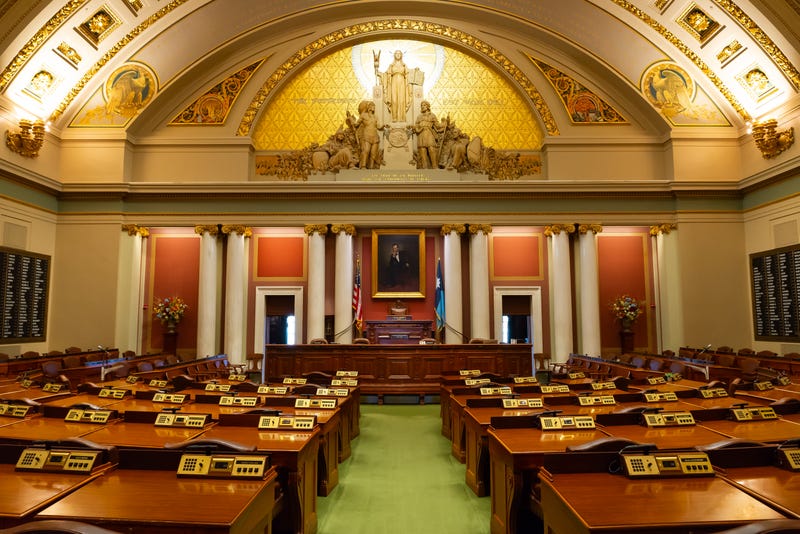
Here we go again. Another Minnesota legislative session has come and gone without mandated agreements in place for the state's two-year budget.
That means Minnesota Governor Tim Walz is getting ready to call a special session of the Minnesota legislature after lawmakers failed to finish work on a $66 billion budget before Monday night's deadline.
There is a push to get their ducks in a row before the upcoming Memorial Day weekend, but the governor isn't making any commitments. He's also still wanting just one day for a special session despite some lawmakers saying now it could take multiple days.
"I would caution, again, for the legislature, once we get past June 1st, we'll be obligated then to start looking at, what does it look like if you shutdown? That means we send out the layoff notices and things like that," explains Walz. "That is not without a cost, and I would just argue with all the time we've had to do this, we've got plenty of time to finish this over the next few days. Just continue to work on this, button these things up."
Unlike past sessions, there was not final push to get things done on the final day. Both the Senate and the House adjourned before the midnight deadline.
This will be the first special session of the Minnesota legislature since 2021. The earliest it can start is this Thursday.
Walz does say he's confident they will get the work done in a special session, and work out all the differences.
"There's some tough compromises in here," the governor said. "We know that not everybody's happy. But I say once again to Minnesotans, against the backdrop of the dysfunction in DC, this is a pretty remarkable thing to see the most closely divided legislature in Minnesota history working together in a fiscally responsible way. Of dealing with it. So I'm very confident we'll get those things done."
Session started bumpy and ended bumpy
Meanwhile, lawmakers are still scurrying to find common ground on a number of budget items that did not pass before the adjournment.
The session began with controversy in the House, with Democrats boycotting the first three weeks before the sides reach a power-sharing agreement due to a 67-67 tie - while waiting for one district's special election to be held the Republicans did hold a one-seat majority however.
That agreement eventually installed Republican Lisa Demuth (Cold Spring) as House Speaker.
"It is really interesting as you watched the the stutter, start, stop, start, you know, the whole thing that kind of went through as we tried to get set this year, nothing was exactly perfect," Demuth explains. "It was really hard but I think the power sharing overall went very well."
House Speaker Emerita Melissa Hortman (DFL- Brooklyn Park) criticized some Republicans for failing to work with Democrats during the session. She says those House members failed to accept an invitation to be bipartisan in crafting budget-related legislation. Those were the same claims Republicans made about the DFL while that party held a trifecta during the last budget session in 2023.
"The opportunity is to really be bipartisan," says Hortman. "The opportunity is to team up and work together and to kind of step out of that normal Democrat versus Republican frame. Unfortunately some people haven't accepted that invitation, so we're doing it kind of the old-fashioned way."
Lawmakers working to overcome deep political divides
WCCO political analyst Blois Olson says one of the things they're working on is a new agreement that gets them through this Wednesday where they're going to have working groups. Those would begin working on issues Tuesday.
"They're going to be the conference committee members that couldn't work out their differences since last Thursday," Olson said on the WCCO Morning News. "And it really is the big issues. Governor Walz does hold the keys to whether or not they come back and so now we'll spend the next two days trying to work out what they couldn't work out in five days. And the leaders, with the exception of (Sen. Minority Leader) Mark Johnson (R- East Grand Forks) all signed the agreement. So Plan B, Plan C? I don't know what plan we're on, but that's what their next plan is, is to get that figured out, and if they do, then the governor thinks he'll call them back for one day."
As for the perspective of voters who wonder why each budget year, it seems like lawmakers can't work out differences before a special session, but is that just "doing their job?"
Those issues are also reflected nationally where Congress is deadlocked over President Donald Trump's multibillion-dollar tax cut and spending package with Republicans not able to come together on an agreement.
Olson says while voters have a right to be frustrated, this is part of the work that needs to be done in a deeply divided political landscape.
"I think the divide has a lot to do with it here. I think each site also has a different philosophy," Olson tells WCCO's Vineeta Sawkar. "Just to go in the weeds a little, Speaker Emeritus Hortman has always had this vision and this philosophy that policy and budgets don't belong together, and the Democrats kept trying to hold that this this year. Well, you can't pass all the policy Democrats passed and then move to a tie and not think Republicans are going to use that for leverage. So I agree, they're doing their job."
